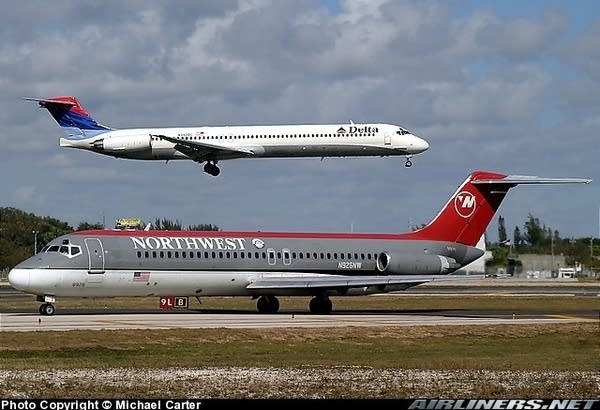NWA-Delta merger goes forward; deal draws mixed reactions
Go Deeper.
Create an account or log in to save stories.
Like this?
Thanks for liking this story! We have added it to a list of your favorite stories.

There weren't many surprises in the long-awaited merger announcement of Delta and Northwest Airlines. Most details have leaked out in the past two months.
But there are still lots of questions to be answered about the $3.1 billion stock swap deal. And many issues that will have be dealt with, including everything from getting the deal approved by federal regulators to the logistical challenges of combining plane fleets, employees, computer systems and much more.
The combined airline will be branded as Delta and based in Atlanta. Richard Anderson, Delta's CEO and the former CEO of Northwest, will lead the airline.

The new Delta will be the biggest airline in the world with about $35 billion in annual revenue, some 1,000 jets and about 75,000 employees. Delta expects the merger will produce more than $1 billion overall in annual revenue gains and cost savings.
Turn Up Your Support
MPR News helps you turn down the noise and build shared understanding. Turn up your support for this public resource and keep trusted journalism accessible to all.
Delta says there'll be no job cuts for most employees, including in Minnesota where Northwest has about 11,600 employees.
And Delta is indicating there won't be any big changes in flight operations at hub airports, including Minneapolis-St. Paul International.
World Perks frequent filer miles are safe. There'll be no messing with them.

Aviation consultant Darryl Jenkins worked for a consulting firm that advised Delta on the transaction. He said the deal is all about creating a bigger, stronger airline, capable of getting passengers to just about any point in the world.
"Now you have a global airline that can compete for global contracts. And the global contracts are the ones that produce the most revenue and that is the benefit of this merger," said Jenkins.
Delta expects it can grab a lot more business from big-spending globe-trotting business travelers who want to deal with one airline as much as possible.
Jenkins said that Delta, with its acquisition of Northwest, will have unmatched reach and great earning power.

"Delta has increased the number of markets that it flies into. It has increased its product line incredibly. And so its ability to generate revenue will increase as well," Jenkins said.
Historically, international flying has been much more profitable for U.S. carriers than domestic flying. That's because there's less competition on international routes.
The U.S. Justice Department will review the deal, assessing if it could seriously harm competition. But Jenkins doesn't see any antitrust issues that would kill the deal. Jenkins said there's not much route overlap between the airlines, and therefore not much impact on competition.
"I think this is going to breeze through the Department of Justice. Congress always throws a fit over anything that happens. But it's the Department of Justice that makes the final decision. And, I think, for them this will be a very easy decision," Jenkins said.
[image]
But not everyone shares Jenkins of view of the deal. Northwest's pilots, for instance.
The pilots are not happy the merger is going forward without an agreement about how to merge the seniority lists of Northwest and Delta pilots. And Northwest pilots are livid about Delta giving Delta pilots a new contract and pay and benefits increases to win the Delta pilots support for the merger. There are no pay raises now for Northwest pilots, or other Northwest employees. Delta said there'll come down the road.
In a statement Monday night, the Northwest pilots union said Delta is following a "recipe for failure."
The Northwest pilots say Northwest would be better off remaining independent.

The pilots may be posturing, taking a hard line position to try to maximize what they can extract from Delta. But consultant Hubert Horan said the Northwest-Delta merger could be much worse than the 1986 merger of Northwest and Republic airlines. Horan also noted the union for Northwest's ground workers has also announced its opposition to the merger.
"Serious labor unrest means the chance of its being an operational and service mess, along the lines of what Northwest and republic was for many years," Horan said.
Horan said it'll likely costs hundreds of millions of dollars to combine the airlines and odds are pretty good that the costs will outweigh the benefits.
"You might execute this properly and not screw it up. But in the real world of these airlines in this kind of environment, there's a huge chance that it does get screwed up," Horan said.

Horan contends the merger is not about preparing Northwest and Delta for the future. In his view, it's primarily an attempt to bail out hedge funds and other investors who've run up tremendous losses with their airline investments.
Horan also sees the merger as an attempt by Northwest , Delta and their European partners to lock up control of very profitable North Atlantic routes.






